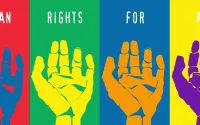There are an enormous number of assumptions in this standard description. Since in many cases, perhaps most cases, elections matter, voters often feel passionately about the elections - before, during, and after - and quite often do not accept passively the results of the elections. That is, they protest that the elections were unfairly conducted or even fraudulent, and that therefore the results are illegitimate. This happens quite often. If one thinks of recent or forthcoming elections in the world, there have been a series of elections with contested results: for example, Iran, Venezuela, the United States, Georgia, and Ukraine in 2004, and Iraq and Palestine, upcoming in 2005 and already being contested in advance. It is important to note that not all election results were controversial. Many countries had elections in 2004 about which no serious questions of legitimacy were raised - for example, Canada, Spain, Uruguay, and India.
It is illuminating therefore to see the kinds of questions that have been raised in the contested elections, and the reasons why they did not go sufficiently smoothly such that no one bothers to write about them, except to analyze why the winners won. We should start by assuming that there are always some practices in an election that do not follow the theoretical rules of legality and fairness. It is usually only when the elections are close enough that such practices could have changed the announced results that much fuss is made.
The first, perhaps most elementary question, is who has the right to vote. The concept of free and fair elections usually assumes that all citizens over a certain age (usually 18 or 21) are eligible to vote. Today, anything less than universal suffrage of both sexes is considered less than a free election. Since these provisions tend to be legal ones in most countries and in effect for some time previous to the election, disenfranchisement is not usually raised as a current issue. But it was precisely raised by some in the context of the U.S. elections. In the U.S., where the rules vary according to the individual states, the question of whether felons can vote is an important consideration. Only two states out of 51 jurisdictions permit prisoners to vote. And some states permanently disenfranchise felons even after they have completed their sentences. Since prisoners come disproportionately from minority groups, the effect is to reduce significantly the rights of Blacks to vote in certain states. And this, given the system of the electoral college, can decisively affect the outcome. For example, George W. Bush would have lost the 2000 elections, if felons were not largely barred from voting in Florida. How much this would have affected the 2004 elections is unclear.
Who can stand for election? This was a major issue in the Iranian elections. In the current system, there is an official organ that has to certify the right of a given candidate to stand for election. This structure was controlled by one major faction in the elections, and it declined to certify large numbers of the candidates of the other faction from being on the ballot. In the forthcoming Palestinian elections, would the Israelis have permitted Marwan Barghouti, currently imprisoned, to stand for election as president, to campaign, and if elected to serve?
Who has access to the media? This is a question of who controls the media, and by money. In some cases - notably Georgia, Iran, and potentially Iraq, the government had heavy control over the media, thereby depriving the opposition of the ability to argue their case in the media. In the case of Palestine, Israel controls the media, and we shall have to see what the impact of this control will be. The issue of money and its impact on access to the media, which sell their space, has long been a major issue in the United States.
But all these issues occur, so to speak, prior to the actual voting. It is in the actual voting that most of the serious complaints are normally made. The first is that of intimidation of the voters. Intimidation can take many forms. There is the effect of mobilization of voters by strong-arm methods, or conversely preventing voters from voting. The opposition accused this in Venezuela. This will certainly be an issue in Iraq. But there are other subtler forms of intimidation. It was argued that in the U.S. elections, intimidation took the form of challenging without good reason the right of voters to vote or by spreading untrue rumors about the rights of voters to vote. It is feared that the continued presence of Israeli troops in Palestinian areas may have the affect of making it difficult for Palestinians to vote, and certainly of candidates to campaign.
The biggest issue always is the actual counting of the votes. This was an issue in Venezuela, the United States, Georgia, Ukraine, and looking ahead quite likely in Iraq and Palestine. In Venezuela, the opposition to this day contests the counting, but groups of international observers asserted that the counting was fair and the results are today generally accepted. In the United States, the counting in some states is still being contested (including in the courts). One complaint, the result of advanced technology, is that there was manipulation of computer-generated results where there exists no so-called paper trail. The evidence, largely disseminated by internet, comes from a series of calculations which show that some results are statistically highly improbable. In Georgia, as a result of street rebellion, the government backed down and in effect admitted that the initially announced results were fraudulent. This is what is being debated right now in Ukraine. These questions are always complicated by the rules concerning recounts, and the decisions of the electoral commissions or the courts (which are themselves open to being contested, as in Venezuela, the United States, and Ukraine).
And then there is the question whether one can have fair and free elections in situations of political and military disorder. This is the central question today about the forthcoming elections in Iraq. For example, the combination of the insurgency and the call for either boycotting or postponement of the elections by most Sunni political parties and religious authorities may mean, will probably mean, that Sunni participation in the voting will be very minimal, in which case can the results be considered legitimate?
Finally, there is the question of outside interference. The government in Venezuela charged the United States with overtly supporting the opposition. In Georgia, Ukraine, Iraq, and Palestine, there have clearly been outside forces not merely interested in the results but inserting their influence actively in affecting the results, or in affecting the post-election debate about the results.
In general, there is a good deal of hypocrisy when one invokes the concept of free and fair elections. Elections are supposed to decide political results. But quite often the causal arrow goes the other way. Politics decides the ostensible results. And sometimes, in contested elections, a behind the scenes political compromise affects whether or not the results are considered legitimate.
It is not that elections should not be fair and free. It is that we are a far way from ensuring that this occurs across the world, North and South. And an old maxim tells us that those who live in glass houses should not throw stones, or at least should do so with much prudence.






